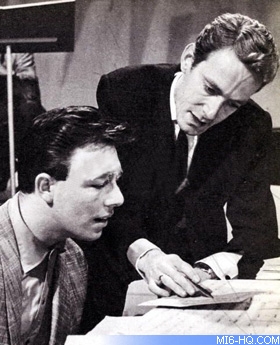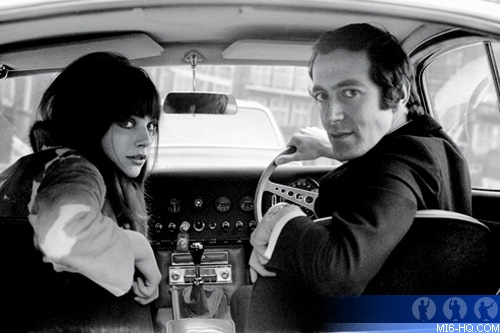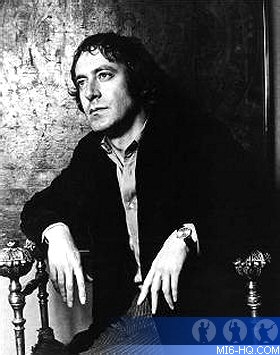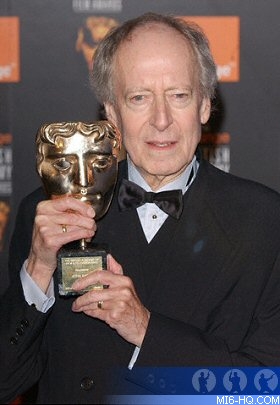|
|
|
 |
| |
Guest writer Adam Bollard looks back fondly on the music and magic of 11-time James Bond composer, John Barry...
|
|
John Barry: Music Master
2nd February 2011
I've been lucky enough to meet a few Bond alumni - among them Sir Roger Moore and George Lazenby - and one member of that esteemed company I've always wanted to shake the hand of has been John Barry. Sadly, however, that's no longer possible. John Barry, legendary composer to the escapades of 007 and so many more films has died, aged 77.
He was born John Barry Prendergast in 1933 and grew up in York, England. The son of a cinema chain owner, Barry spent hour on hour of his youth immersing himself in the world of the movies and soon became hooked on the music they featured - early favourites were the scores from "The Adventures Of Robin Hood" (1933) and "The Treasure Of The Sierra Madre" (1949). His mother had harboured ambitions as a concert pianist, but not John; he gave up the piano and picked up the trumpet at the age of 15 and, having been turned on to jazz by his older brother, set up a dance band called The Modernaires after leaving school. |
|
 Right: John Barry (right) with Les Reed. Right: John Barry (right) with Les Reed.
|
Following a stint in the army, during which he played with military bands in Cyprus and Egypt, he returned to the UK and formed The John Barry Seven, a jazz combo of, yes, seven members.
With this new band, he produced hit tunes such as "Hit And Miss" and "Walk Don't Run", the latter performed by "The Ventures" and chosen as the theme for the BBC's top light-entertainment show "Juke Box Jury". He also composed songs for British rock 'n' roll star Adam Faith, both for the latter's chart career and his films, as well as orchestral accompaniment for EMI's recording artists. The combination of this work brought him to the attention of two anglo-American film producers, Albert R Broccoli and Harry Saltzman, who were making the film "Dr No" (1962), based on one of Ian Fleming's popular novels featuring superspy James Bond. The two felt that the work composer Monty Norman had produced for said film required some extra oomph. What Barry came up with was a re-arrangement of a Norman composition, fusing jazz, rock and orchestra together in a two-minute sensation of excitement - it was the James Bond Theme.

Above: John Barry with his then-wife Jane Birkin - sex simbol of the '60s.
|
Barry's time in "Bondage" truly made his name. Unsurprisingly, he was asked back by Broccoli and Saltzman to score the next 007 flick, and the next, and the next, and the next and so on (overall he would score 11 of the first 14 movies). He didn't just play a critical, creative role in the film series' incredible success, but also, by forging such a dynamically new musical style, he arguably transformed film composing. Like the movies themselves, Barry's Bond scores of the '60s were thrilling, pacy, outlandish, tight and utter dynamite (the soundtracks themselves rightly sold like hot-cakes - Goldfinger's score knocked The Beatles' "A Hard Day's Night" LP off #1 in the States).
Mixing jazz sensibilities and rock 'n' roll rhythms together with show-style orchestral strings and brass, the 'Bond sound' was not quite like anything heard before or since, influencing scores of musicians to come - for instance, Quincy Jones would have been quite different if not for Barry; Mark Ronson simply wouldn't exist (admittedly, you may see that as a good thing). Plus, let's not forget that the Bond tunes of the '60s, all of their music written by Barry, weren't just among the most popular songs of the decade, but also helped push the careers of Shirley Bassey, Tom Jones and Nancy Sinatra into the stratosphere.
John Barry's innovations didn't stop there, however, nor did they with Bond. By the end of the '60s, he was introducing Japanese influences into his scores ("You Only Live Twice"), synth-sounds ("On Her Majesty's Secret Service" - perhaps his best 007 score) and pop (the beautifully, liltingly melancholic "Midnight Cowboy"). Indeed, melodic melancholia could be said to be a stong signature of Barry's post-'60s work. His later Bond scores ("Moonraker", "Octopussy" and "The Living Daylights" among them) featured slower, more sensuous orchestral movements compared to the spunky, funky stuff of "From Russia With Love" and "Goldfinger". Moreover, his Oscar-winning scores for "Out Of Africa" (1985) and "Dances With Wolves" (1990) took melancholic melody to a new level.

"He didn't discuss or ask your opinion or anything [about his compositions]. He didn't have to. He knew it was great." - Michael Caine on John Barry
|
|
In 1998, he took this further still, at least to my mind, when his non-film score orchestral project "The Beyondness Of Things" was released. A collection of 12 exquisite compositions (each of them could have been the main theme from a movie - listen to two of them, The Fictionist and Dawn Chorus, in the video at the end of this post), it was followed up by another collection two years later entitled Eternal Echoes.
Indeed, on the "Out Of Africa" score Barry himself said in a 2009 interview with Vanity Fair magazine: "I mean, if you [use the music to] just follow the action—that's what you do with a Bond movie: you follow the action. That's the glory of it. You go for the jugular on everything—you know, as I once remarked, subtlety is not a virtue on a Bond movie. But with other movies you break your ass trying to find out: What can I do that's still going to really work for this, but add another dimension to it? It's not about going with the action; it's going with what the people in the movie are feeling. If you can capture the love story, like in "Out of Africa" - the feeling between those two people—that's what I write about. And when they [Meryl Streep and Robert Redford] go in that plane and she puts her hand back, to me it was a golden moment, when it was just the communication between them. I mean, that broke my heart. That is what the whole movie is about." |
Across his career, Barry scored more than 80 movies and produced unforgettable TV themes such as for the Roger Moore-Tony Curtis adventure series "The Persuaders!" (1971-72) and the telly spin-off of the movie "Born Free" (1966), the latter possessing another terrific film score and song for which he won an Oscar. Actually, in total, he was nominated for seven Oscars, winning five, and won a clutch of Grammys, Emmys and BAFTAs. He was also awarded a BAFTA Fellowship in 2005.
Less known about him, perhaps, is that he was good friends with film stars and Swinging '60s icons Michael Caine and Terence Stamp. In fact, according to Caine, back in the day the three of them were compadres about town, hitting London's hippest night spots and trying to score with the ladies - which, apparently, the cool, smooth and always well tailored Barry did. Maybe proof of this can be found in the fact that in 1965 he married another icon of the age, the oh-so sexy Jane Birkin. He was married four times in total, had as many children children and finally settled in Long Island, New York, with his fourth wife Laurie.
John Barry's last project was to provide a song for Shirley Bassey's latest album released in 2009; co-written with former lyricist Don Black, a former Bond colleague, it was entitled "Our Time Is Now". It's a cliché to call a great artist a genius - indeed it's a cliché itself to trot out that statement - but to my mind, as far as film scoring goes, Barry was a genius; they simply come no better than him. He's passed and indeed the world is a lesser place for it, but owing to the great work he's left us, John Barry's time is forever; simply forever. |
|

Above: Barry accepts his BAFTA award.
|
Many thanks to Adam Bollard...
The views of this columnists expressed in this article are not necessarily those of MI6_HQ.com or its owners.
|
|
|







